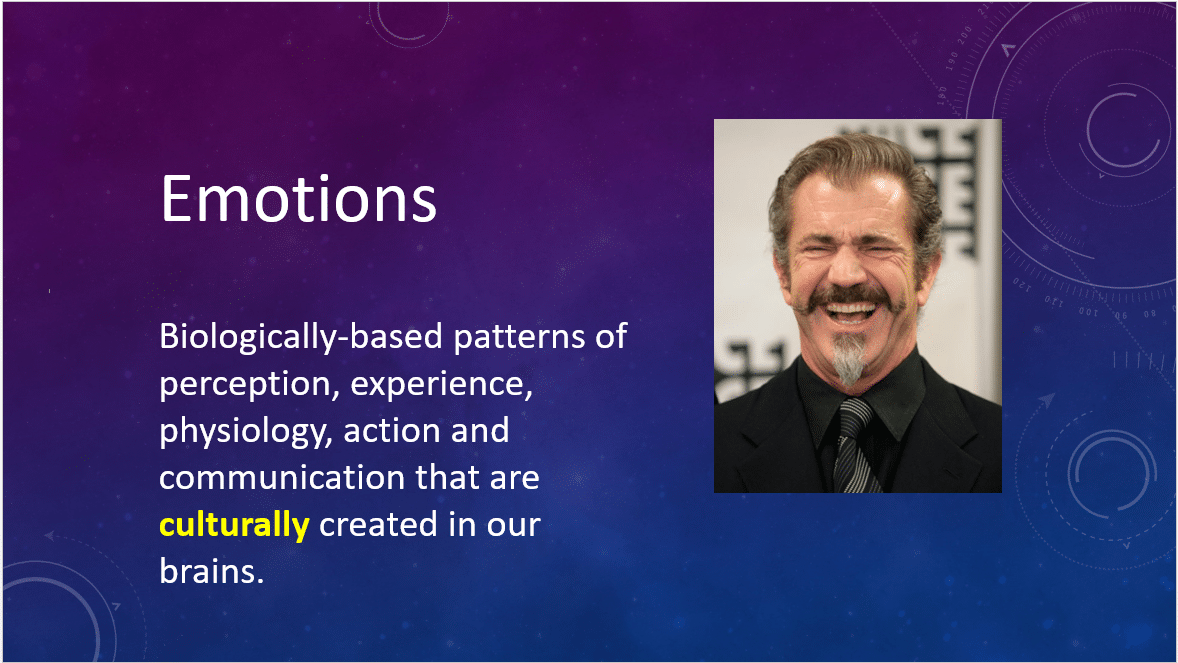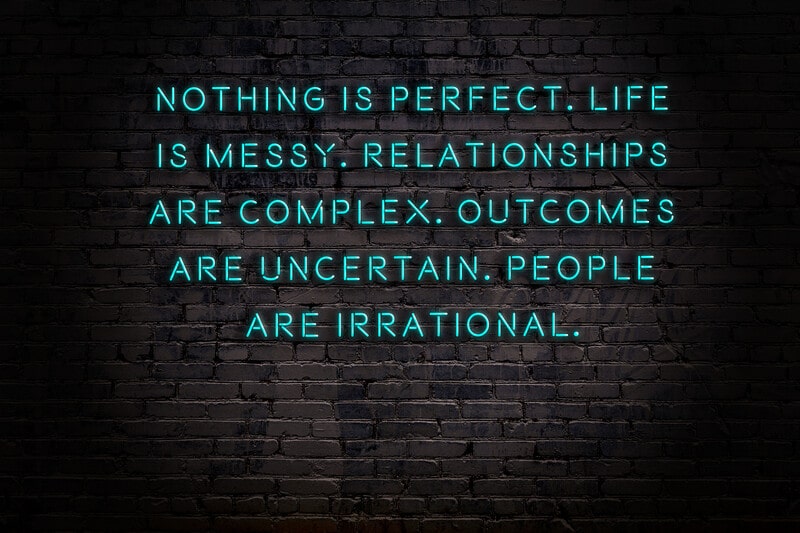How to Honor Your Emotions and the Emotions of Others
In this session, we wanted to kind of answer the question: how to honor your emotions and the emotions of others without being weak, vulnerable or defensive. The reason that this question comes up is because, in my experience as a mediator and peacemaker, I notice that when people talk about emotions, they often are defensive about it. They feel their emotions are weak or they feel like emotions are irrational. They don’t want to talk about emotions, and they feel like if they talk about emotions, that they are somehow less than. This belief permeates our culture and society going back almost 4 000 years, even before the Greeks.
Humans Are 98% Emotional and Only 2% Rational
There is a myth that states that what separates humans from other animals is rationality. The truth from neuroscience is that we’re 98% emotional and only 2% rational. So that means we are leaving 98% of who we are on the table. We are not bringing 100% of who we are to bear on anything that we do. So, in my view, learning how to honor your emotions is the most foundational skill you can learn.
If you do not learn how to honor your emotions, then you will be a slave to your emotions. They’ll control you; you won’t control them. Whenever you confront someone who is emotional, you will never quite know what to do. Oftentimes, you will react from old programming and just make things worse. My motivation is as a peacemaker is to prevent fights and arguments by teaching you how to honor your emotions.
What Are Emotions?
Emotions are biologically-based patterns of perception, experience, physiology, action and communication that are culturally created in our brains. They are essentially cognitive constructs that we create in our brains, starting at about 18 months of age. We are not born with emotions; we have to create emotions and that is part of the developmental process of growing up. It starts at about the time we verbalize.

We are born with affect, which are the feelings of pleasantness and unpleasantness that we experience. Emotions are the cognitive constructs that allow us to take our affective experience and concretize it into self-awareness. We are not self-aware of affect, but we can become self-aware of emotions. This is the process of learning how to honor your emotions.
Emotions Allow For Inferences
Emotions allow you to look around figure out what has caused you to get so angry. If you didn’t have emotion, you would not be able to determine what was making you angry. If you cannot honor your emotions, you can’t draw inferences about what is causing them.
Emotions Allow You To Communicate
Emotions allow you to communicate to other people that you are having an emotional experience. That’s very powerful. If all you had was affect, then you have to rely on your automatic programming.You could not communicate anything about what your experiencing. This is why so people experience, “I’m so mad. I could punch my fist through a wall.”
Or “I’m, so mad, I could hit something.”
Or “I’m so mad, I want to hit somebody.”
These affective feelings reveal a lack of emotional self-awareness. When you are feeling an affect so strongly that you can’t manage all of the underlying emotions, and the only way you can relieve the discomfort is through physical action, and that is the source of a lot of violence.
Emotions are not feelings; they are very specific systems in the brain. You can learn how to honor your emotions and gain control of your life.
Emotions As Energy In Motion
Another way to think about emotions is as energy in motion.
When we think about a two-year-old or a five-year-old or a six-year-old or an eight-year-old having big emotions, they are going through major maturation moments.
Emotions carry a particular vibration. When you let yourself be in the emotional experience that vibration starts to change you.
The vibration of the cellular tissue, which then changes the consciousness of the physical human form. From my perspective, we are souls riding in a body. Our body is a nature spirit. It has its own unique consciousness.
Why Do We Believe Emotions Are Weak?
Why is it that we believe emotions are signs of weakness, vulnerability, or irrationality? The reason is really pretty simply stated. Up until 20 years ago, before the advent of neuroscience all we had to work with were the observations of people’s behaviors. It became very obvious thousands and thousands of years ago that when people were emotional, they were not rational. They weren’t able to think clearly; they made bad decisions.

They engaged in oftentimes engaged in destructive behaviors. It didn’t take much wisdom to see that people who were emotional often times lost control of themselves in very destructive ways. Over Millennia, philosophers and theologians have argued and taught that being emotional is bad because they cannot be controlled.
In Plato’s Phaedrus, Socrates talks of the myth of the chariot. The charioteer is filled with warmth and desire as he gazes into the eyes of the one he loves. The good horse is controlled by its sense of shame, but the bad horse, overcome with desire, does everything it can to go up to the boy and suggest to it the pleasures of sex.
The bad horse eventually wears out its charioteer and partner, and drags them towards the boy; yet when the charioteer looks into the boy’s face, his memory is carried back to the sight of the forms of beauty and self-control he had with the gods, and pulls back violently on the reins. This conflict between emotion and reason continues forever.
Practical wisdom informs you that when you are highly emotional, you can’t think clearly. No matter what people say about free will, you cannot will yourself to stop feeling an emotion. That’s, just the nature of the physiology of the brain. Instead, you must learn how to honor your emotions, rather than fight them.
The Rugged Individualist Is A Myth
The whole idea of the rugged individualist a complete myth. When the west was opened up, people only survived because they formed communities. You can’t raise a barn by yourself; you need a bunch of people helping you raise a barn. You can’t harvest a crop by yourself; you need people to help you harvest a crop. So this idea of rugged individualism, which is somebody who can tough through anything, shows no emotions and never let’s anyone see them sweat is all mythical.
But until you learn how to honor your emotions, you’re at the mercy of your brain.
Why Are We Defensive Around Emotions?
Why are you defensive when other people are emotional around you? The reason is practical experience has taught you that when people are emotional, they’re unpredictable. That’s what it looks like when somebody gets really angry. We don’t know what that person is going to do and that creates an anxiety within ourselves. Our anxiety drives us to either run from that emotion or stop that emotion. The antidote is to learn how to honor your emotions and honor the emotions of others.
We get anxious over the two-year-old tantrum, because we don’t have any way of moderating that two-year-old’s emotional experience. Until we learn how to honor emotions, we are defensive. Emotions are scary because you’ve never been taught how to honor your emotions in a way that makes them powerful tools.
The Power of Learning How To Honor Your Emotions
Some of the tools and the practices that we teach is how to hold a safe space and validate another person’s emotional experience. How do you honor your own emotions and honor the emotions of others? It’s very simple: it’s a process that’s technically called affect labeling or reflecting back the emotional experience of another person. 12 Powerful Benefits of Emotional Awareness
Affect labeling is a three-step process.
Step One; Ignore the words.
Step Two: Read the emotions.
Step Three: Reflect back the emotions with a simple “You” statement.
So you might say: “You’re really angry!” “You’re really upset.” “You feel frustrated.” “You don’t feel listened to.” “You don’t feel heard.” “You’re really anxious.” “You’re sad.”
Howdo you go about honoring your own emotions and the emotions of others? In the beginning, start practicing silently where you’re watching people. Silently say to yourself, “You’re, really happy!” “You’re really excited.” “You’re, really scared!” “You are angry!”
There is a lot more to learn about how to honor your emotions. We have created two courses that will teach how to honor your emotions and honor the emotions of others. Enroll in the online courses here.


Thanks for visiting. I hope this is informative and useful information.
I gu?ss for now i’ll settle for boo?marking and adding your RSS feed to my G?ogle account.